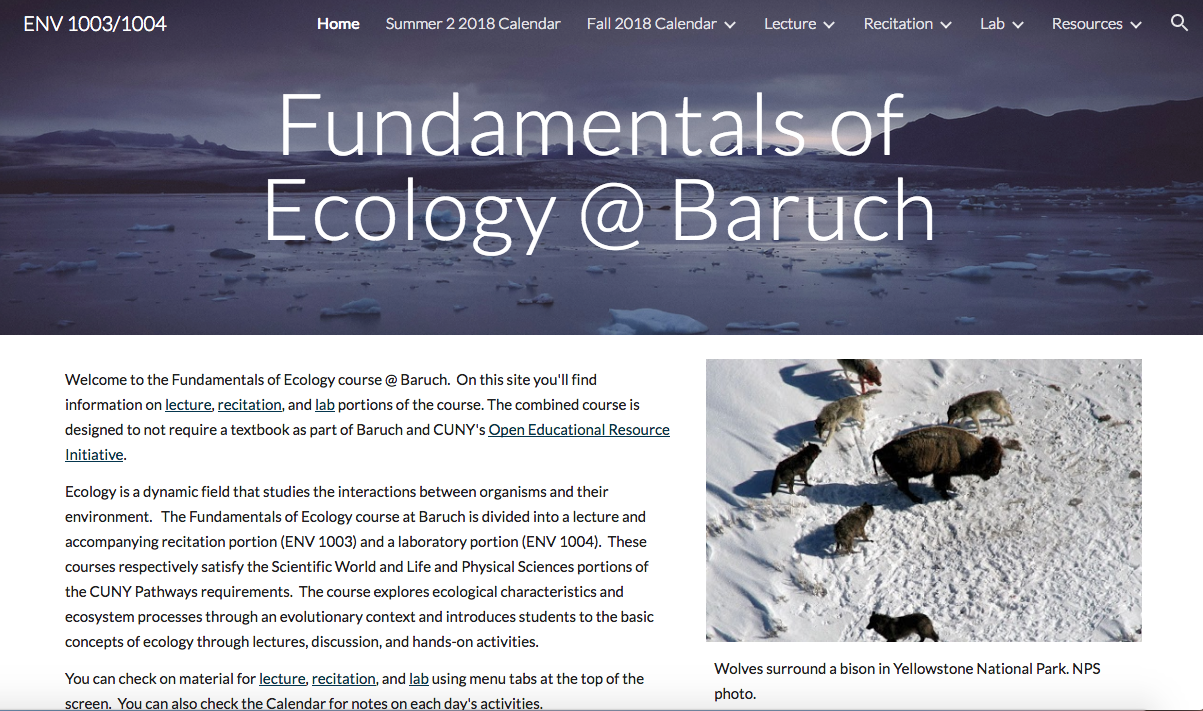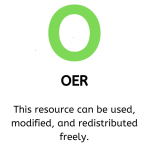| Developed by Stephen Gosnell, Natural Sciences, Baruch College, CUNY |
The Fundamentals of Ecology combined course at Baruch consists of independent lecture and lab courses. While most students take both to fulfill two City University of New York (CUNY) general education requirements, some do not, and thus the courses must be relatively independent.
The oer & COurse Artifact
OER materials for Foundations of Ecology were housed on the public web site: https://sites.google.com/view/env10031004/home

The website contains collected background readings from open-source sites such as Biology 2e from Openstax, and also provides lecture slides to assist instructors in preparing for class. The laboratory portion of the course, also outlined on the site, contains detailed instructions, and served as an online lab manual. Instructors who use the website are provided test banks to use for homework assignments.
transitioning to and Teaching with OER
While reasons to begin using OER materials were often student-based issues, instructors also wanted to make sure the transition to OER material did not adversely impact instructors. Both lab and lectures courses are taught in multiple sessions fall, spring, and summer at Baruch College by multiple instructors. Instructors needed to ensure new instructors for the course had material they needed (and that publishers often provided) to begin preparing for the course. For these reasons, we developed a set of web-based resources to be used for both the lecture and laboratory portions of the course.
Our largest issue in moving to an OER-based course was the current lack of a complete OER ecology textbook. To overcome this issue we used information from multiple sources, ranging from government websites to OER material produced through other grants. One major component for the course was Biology 2e (https://openstax.org/details/books/biology-2e), a textbook from the OpenStax collection. Biology 2e had several introductory chapters for ecology that were extremely useful, and information on evolution was also very pertinent for the course.
Beyond assembling a reading list for the course, creating lecture slides that utilized open source material proved to be extremely time-consuming. However, our decision to include more figures from original papers and links to contemporary reports really helped shape the course. Students were also very pleased with the website design and ability to see their suggestions being implemented as the course progressed.
Why choose OER?
Instructors of the course decided to begin using OER material in these courses for several reasons.
- Students were not purchasing the current material. The courses are designed for non-majors who rarely felt a need to permanently own the text. This fact, combined with high prices and publication delays for course packets we had developed ~7 years earlier, were leading to many students not purchasing the material.
- The current curriculum was not as engaging or contemporary as we desired. Non-major science courses have the difficult task of engaging students from various fields and teaching them to be “scientists” while focusing on a specific field of study. The materials we reviewed did not strike the balance between introducing students to both science and ecology in an active manner that we desired.
- We wanted the next phase of the course curriculum to be able to by dynamically updated. Ecology is a field most students pursue based on a combination of lifetime experiences with the natural world (pets, zoos, and gardens, for example) and an interest in recent news issues (e.g., climate change). Instead of simply updating a course packet or choosing a new textbook, we wanted to create a living, adaptive course that we could easily update as needed.
Instructors reported that overall, the process of designing an OER course that included both the creation of material and the curation of work produced by multiple sources was extremely rewarding. The design saves students money, but just as importantly it engages them and allows instructors to truly teach to their strengths by adapting and adjusting material as needed.
Faculty Information
Stephen Gosnell is an Assistant Professor in the Department of Natural Sciences @ Baruch College. His research attempts to understand the drivers and consequences of diversity in order to better manage natural resources. While his field work focuses on coastal communities, he also uses large-scale data analysis to explore these issues in multiple locations. His teaching interests include ecology, conservation biology, and biostatistics. More information can be found @ www.jstephengosnell.com.
Licensing information
![]() The teaching resources for Fundamentals of Ecology are licensed under a Creative Commons Attribution-NonCommercial-ShareAlike 4.0 International License.
The teaching resources for Fundamentals of Ecology are licensed under a Creative Commons Attribution-NonCommercial-ShareAlike 4.0 International License.


